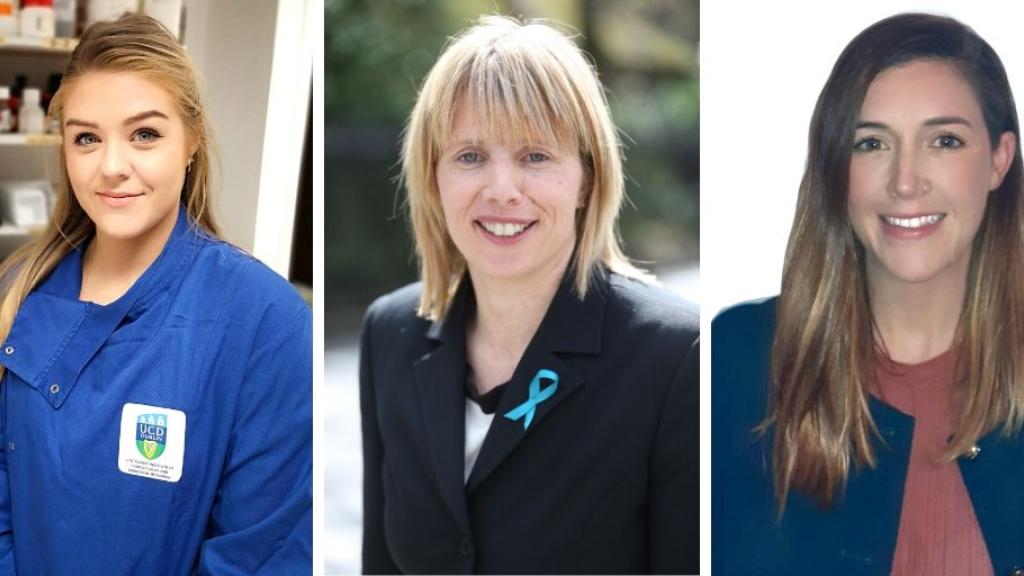
Cancer Research Engagement Award 2019
As the largest voluntary funder of cancer research in Ireland, the Irish Cancer Society is committed to putting patients, families, survivors, supporters and the public at the very heart of what we do.
Research is conducted primarily for the benefit of patients. Therefore, a key priority of the Irish Cancer Society is to ensure that the patients are informed about, engaged with, and involved in cancer research.
In line with this, we launched the Cancer Research Engagement Awards.
The Cancer Research Engagement Awards provides funding for researchers based in the Republic of Ireland to organise engagement activities to promote cancer research to people affected by cancer and the public.
We awarded three Cancer Research Engagement Awards this year. Keep an eye out on our social media posts and newsletters for their upcoming events and workshops.
Kayleigh Slater
Kayleigh is a PhD student in University College Dublin. She is studying uveal melanoma, a rare, but often devastating, form of ocular cancer that arises in the eye.
Kayleigh explains “Despite the rare nature of uveal melanoma, it is estimated that Ireland has one of the highest incidences worldwide of this cancer. However, there is very little information available to patients about the disease and ongoing relevant research. As there is currently no standard of care for the treatment of metastatic uveal melanoma, it is important to highlight ongoing research addressing this problem to create awareness among the uveal melanoma community.”
Their goal is to “organise a research engagement day, that will be open to patients and members of the public, to provide accurate and understandable information about ongoing uveal melanoma research from researchers and clinicians in the field.”
“This award will allow us to raise awareness of this devastating disease but also promote the fantastic and ground-breaking research that is ongoing in the uveal melanoma research community. Similarly, we would like to highlight some of the challenges associated with rare disease research.”
On receiving funding, Kayleigh says, “We are extremely grateful to the Irish Cancer Society for giving us the opportunity to run a research engagement day and to create a sense of community within the uveal melanoma research field, one in which patients and the public feel included, informed and supported.”
Dr Sharon O’Toole
Sharon is a senior research fellow in Trinity College Dublin working in the area of gynaecological cancer. Her research interests centre around diagnostic and prognostic biomarkers and understanding the fundamental biology of the metastatic cascade and circulating tumour cells.
The aims of Sharon’s project are “to educate patients and the public on cancer biobanks and their purpose; to engage with patients and the public; and use this to inform how research projects are run; how our current research programmes may be improved; and to increase awareness and participation in cancer research among patients”.
Sharon plans to “have a novel cancer biobank awareness day where biobank managers/researchers can update patients and members of the public on the research carried out by the biobank. This would become an annual event. This event will be open to patients who have already donated samples and patients with an interest in research who may participate at some point in the future. It will also be an opportunity to hear from patients themselves. This could be a valuable resource for improving the quality of the biobanking process in general.”
Sharon sits on the board of the Irish Society for Gynaecological Oncology with a responsibility for Public and Patient Involvement (PPI). The Irish Society of Gynaecological Oncology Public and Patient Involvement (ISGOPPI) Group will host their next workshop on thursday 28 Noveber 2019 in Galway. If you have been impacted by a gynaecological cancer and want to have your voice heard, then please come along. The group aims to improve the quantity and quality of research which will ultimately improve health services and outcomes. Please sign up via Eventbrite.
Dr Michelle Norris
Michelle has a background in Sport and Exercise Sciences, and has completed a PhD focused on the analysis of recreational runner’s lower limb patterns when training for full and half marathons. Michelle is now a Marie Sklodowska-Curie COFUND Research Fellow in the ALECS Programme, in Lero - The Irish Software Research Centre, based in the University of Limerick.
The project which she is working on is titled "BREASTech: Increasing physical activity in breast cancer patients through technology enabled care". It is focused on using Connected Health to increase the physical activity levels of breast cancer patients and survivors.
Michelle explains, “Breast cancer treatment can have a significant negative impact on a woman’s quality of life - an impact which can be reversed through physical activity. However, very few breast cancer patients and survivors are currently meeting recommended physical activity guidelines”.
The overall aim of Michelle’s Cancer Research Engagement Award is “to promote awareness of the importance of physical activity for the recovery of breast cancer patients and survivors, and to demonstrate how interaction with technology can play an important role in supporting this activity”.
Michelle plans to host two half-day workshops in the University of Limerick. “During the workshop, breast cancer patients and survivors will learn about and discuss breast cancer research, the importance of physical activity for their recovery, and how technology can support that physical activity”.
“Following the workshops, a one-day public exhibition of the posters created by attendees will be held. At the exhibition (planned for International Women’s Day, and held in collaboration with the University of Limerick Arts’ Office), attendees and researchers will discuss project outcomes with families, friends and members of the public”.
